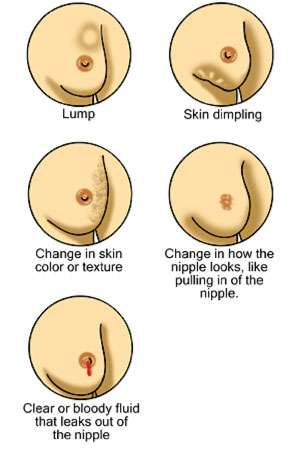Reply To:
Name - Reply Comment

 Previously I have explained why early detection of cancer can significantly improve the chances of a complete cure. Today I will discuss early symptoms and signs of some common cancers which we can keep a lookout for.
Previously I have explained why early detection of cancer can significantly improve the chances of a complete cure. Today I will discuss early symptoms and signs of some common cancers which we can keep a lookout for.
Depending on the site of cancer these symptoms and signs vary. However significant weight loss over a short period of time, loss of appetite and the generalised weakness of the body can be seen in many cancers before the actual site specific signs appear.
Breast cancer
The commonest sign is a lump felt in the breast. This can be found anywhere in the breast or even in the armpit. Also look out for changes in the nipple like a change of shape, position or a discharge coming from the nipple when squeezed. Breast cancer can also present with changes in the skin overlying the breast. (Redness, dimpling etc). If there is a persistent pain in the breast or the armpit, these can be an early warning signs. Some of these signs could be due to normal breast changes or due to a benign breast condition. The best example are small lumps appearing or enlarging only during menstrual period. This most likely is due to benign breast conditions.
Cervical cancer 
This is a cancer originating from the neck of the uterus and is the second commonest cancer in Sri Lankan women. This is usually seen in older women and the commonest symptom is bleeding from the vagina after menopause. In menstruating women there could be bleeding in-between cycles or after intercourse. Pain in the lower stomach or pelvis could be a sign of advanced disease.
Mouth/ Throat cancer
A whitish patch inside the mouth cavity which cannot be rubbed off could be a pre-cancer which if not treated can transform into a full-blown cancer. Other danger signs are non healing ulcers, bleeding from an ulcer or a lump in the mouth. If the cancer is in the throat there can be pain while swallowing or a change in the voice such as hoarseness. If seen in smokers or people who chew betel for a long time they take an added significance as they are more likely to get oral cancers.
Lung cancer
Persistent dry cough is the number one warning sign. This will usually not settle with normal cough treatment. Coughing can also bring out blood stained sputum. Chest pain specially with deep breathing is also a danger sign. Lung cancer can cause fluid to collect in between the ribcage and the lungs. This will prevent the lungs from fully expanding and cause difficulty in breathing.
Oesophageal / Stomach cancer
Oesophagus is the tube that connects the mouth to the stomach. If a cancer occurs here it will obstruct the swallowed food from reaching the stomach. This difficulty in swallowing will be first seen with regard to solid food and then progress to prevent liquids from being swallowed too. Stomach cancer will occur as a tumour or an ulcer in the stomach. Since the tumour takes up space within the cavity of the stomach it will reduce the amount of food you can eat at one go. When you try to eat more it may cause vomiting. Also tumour eroding the lining of the stomach would cause bleeding which can come out with vomiting or pass with stools. When it’s passed with stools it usually takes a tar black colour.
Colon / Rectal cancer
Commonest sign is change of bowel habits. This can be constipation or diarrhoea. Feeling of need to go again just after passing stools is an important symptom. Passing of blood with stools is also a danger sign. Specially if the blood is mixed with stools as opposed to passing of fresh blood after stools have been passed. Dull persistent tummy or lower back pain also should not be ignored.
Prostate cancer
Prostate is an organ found only in men and which surrounds the bladder neck. The urethra which takes urine from the bladder to the end of the penis runs through this. This condition is always associated with age and the prostate gland enlarges in size. Most of the time this enlargement is due to a non cancerous (Benign) cause. However rarely it could be due to a cancer. This expansion of the prostate gland can cause pressure on the urethra causing obstruction to the free flow of urine. This will result in the urge to pass urine frequently, feeling of inadequate emptying of the bladder, poor urine flow or need to strain to pass urine etc. If blood is passing with urine it is more likely due to a cancer rather than a benign condition.
Leukaemia / Lymphoma
The symptoms are mostly due to cancer cells invading the bone marrow and preventing the development of normal blood components like haemoglobin, white blood cells and platelets. Lack of haemoglobin would cause pale skin, lack of energy and easy fatiguability. Low platelets would present with bleeding from gums, easy bruising. Low white blood cells can impact the body immunity and make you more prone for infections. With Lymphoma there will be enlarged lymphnodes which can be felt easily. They can be only in one part of the body or involve different areas like neck, armpits, groin etc.
Brain tumours
Commonest symptoms are headaches and vomiting. If you wake up with a headache and it is relived after vomiting that is a sinister sign. Weakness or numbness of an area or adult onset fits are symptoms of advanced tumours.
These are few of the signs and symptoms of some of the common cancers in Sri Lanka. Most of these can be seen not only with cancers, but also in normal people and in benign conditions as well. So no one should get unduly worried if these symptoms are present. What’s important to remember is to seek medical advice as soon as possible. Depending on the severity, combination of symptoms, risk factors present, the medical practitioner would decide whether further investigation is needed. Being aware of the early warning signs and symptoms might help you to nip this dreaded disease in the bud.
(The writer is a Consultant in Paediatric Oncology and serves the
National Cancer Institute, Sri Lanka. (Apeksha Hospital)